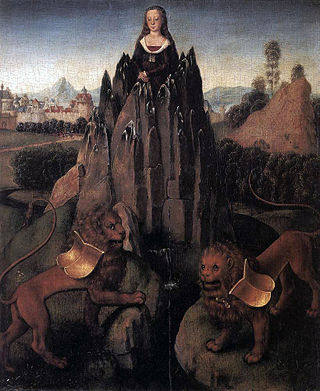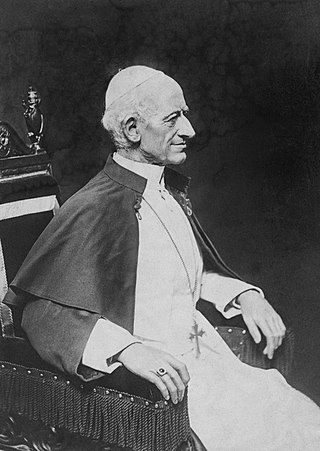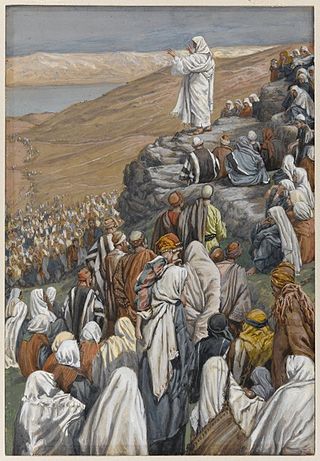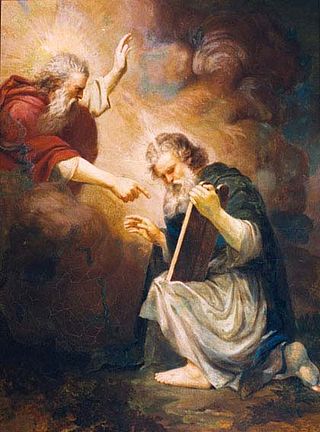Related Research Articles

Chastity, also known as purity, is a virtue related to temperance. Someone who is chaste refrains either from sexual activity that is considered immoral or from any sexual activity, according to their state of life. In some contexts, for example when making a vow of chastity, chastity means the same as celibacy.
Inter mirifica, subtitled "Decree on the Media of Social Communication", is one of the Second Vatican Council's 16 magisterial documents.
Social justice is justice in terms of the distribution of wealth, opportunities, and privileges within a society. In Western and Asian cultures, the concept of social justice has often referred to the process of ensuring that individuals fulfill their societal roles and receive their due from society. In the current movements for social justice, the emphasis has been on the breaking of barriers for social mobility, the creation of safety nets, and economic justice. Social justice assigns rights and duties in the institutions of society, which enables people to receive the basic benefits and burdens of cooperation. The relevant institutions often include taxation, social insurance, public health, public school, public services, labor law and regulation of markets, to ensure distribution of wealth, and equal opportunity.

In politics, integralism, integrationism or integrism is an interpretation of Catholic social teaching that argues the principle that the Catholic faith should be the basis of public law and public policy within civil society, wherever the preponderance of Catholics within that society makes this possible. Integralism is anti-pluralist, seeking the Catholic faith to be dominant in civil and religious matters. Integralists uphold the 1864 definition of Pope Pius IX in Quanta cura that the religious neutrality of the civil power cannot be embraced as an ideal situation and the doctrine of Leo XIII in Immortale Dei on the religious obligations of states. In December 1965, the Second Vatican Council approved and Pope Paul VI promulgated the document Dignitatis humanae–the Council's "Declaration on Religious Freedom"–which states that it "leaves untouched traditional Catholic doctrine on the moral duty of men and societies toward the true religion and toward the one Church of Christ". However, they have simultaneously declared "that the human person has a right to religious freedom," a move that some traditionalist Catholics such as Archbishop Marcel Lefebvre, the founder of the Society of St. Pius X, have argued is at odds with previous doctrinal pronouncements.
In philosophy, economics, and political science, the common good is either what is shared and beneficial for all or most members of a given community, or alternatively, what is achieved by citizenship, collective action, and active participation in the realm of politics and public service. The concept of the common good differs significantly among philosophical doctrines. Early conceptions of the common good were set out by Ancient Greek philosophers, including Aristotle and Plato. One understanding of the common good rooted in Aristotle's philosophy remains in common usage today, referring to what one contemporary scholar calls the "good proper to, and attainable only by, the community, yet individually shared by its members."

Rerum novarum, or Rights and Duties of Capital and Labor, is an encyclical issued by Pope Leo XIII on 15 May 1891. It is an open letter, passed to all Catholic patriarchs, primates, archbishops and bishops, that addressed the condition of the working classes.
Catholic social teaching (CST) is an area of Catholic doctrine which is concerned with human dignity and the common good in society. It addresses oppression, the role of the state, subsidiarity, social organization, social justice, wealth distribution. CST's foundations are considered to have been laid by Pope Leo XIII's 1891 encyclical, Rerum novarum, which advocated distributism. Its roots can be traced to Catholic theologians such as Thomas Aquinas and Augustine of Hippo. CST is also derived from the Bible and cultures of the ancient Near East.
The Friday fast is a Christian practice of variously abstaining from meat, dairy products and alcohol, on Fridays, or holding a fast on Fridays, that is found most frequently in the Eastern Orthodox, Oriental Orthodox, Catholic, Lutheran, Anglican and Methodist traditions. The Teaching of the Twelve Apostles, written in the first century A.D., directed Christians to fast on both Wednesdays and Fridays. The Wednesday fast is done in remembrance of the story of the betrayal of Christ by Judas on Spy Wednesday, while the Friday fast is done in commemoration of the crucifixion of Jesus Christ on Good Friday. As such, all Fridays of the year have been historically kept in many parts of Christendom as a day of strict fasting and abstinence from alcohol, meat and lacticinia. Abstinence from meat on Fridays is done as a sacrifice by many Christians because they believe that on Good Friday, Jesus sacrificed his flesh for humanity. In the Eastern Orthodox Church, in addition to fasting from food until sundown, the faithful are enjoined to abstain from sexual relations on Fridays as well.

Christian ethics, also known as moral theology, is a multi-faceted ethical system. It is a virtue ethic, which focuses on building moral character, and a deontological ethic which emphasizes duty. It also incorporates natural law ethics, which is built on the belief that it is the very nature of humans – created in the image of God and capable of morality, cooperation, rationality, discernment and so on – that informs how life should be lived, and that awareness of sin does not require special revelation. Other aspects of Christian ethics, represented by movements such as the social Gospel and liberation theology, may be combined into a fourth area sometimes called prophetic ethics.
Centesimus annus is an encyclical which was written by Pope John Paul II in 1991 on the hundredth anniversary of Rerum novarum, an encyclical issued by Pope Leo XIII in 1891. It is part of a larger body of writings, known as Catholic social teaching, which trace their origin to Rerum novarum and aim to relate the teachings of Jesus to the industrial age.

The Second Episcopal Conference of Latin America was a bishops' conference held in 1968 in Medellín, Colombia, as a follow-up to the Second Vatican Council which it adapted in a creative way to the Latin American context. It took as the theme for its 16 documents “The Church in the Present Transformation of Latin America in the Light of the Council", with a focus on the poor and oppressed in society. It recognized that “the social situation demands an efficacious presence of the Church that goes beyond the promotion of personal holiness by preaching and the sacraments.” The bishops agreed that the church should take "a preferential option for the poor" and gave their approval to Christian "base communities" in which the poor might learn to read by reading the Bible. The goal of the bishops was to liberate the people from the "institutionalized violence" of poverty. They maintained that poverty and hunger were preventable.
The Winnipeg Statement is the Canadian Conference of Catholic Bishops' statement on the papal encyclical Humanae vitae from a plenary assembly held at Saint Boniface in Winnipeg, Manitoba. Published on September 27, 1968, it is the Canadian bishops' document about rejecting Pope Paul VI's July 1968 encyclical on human life and the regulation of birth.
Social teachings of the papacy encompass papal views described in social encyclicals and other papal communications, beginning with Rerum novarum, Pope Leo XIII's encyclical of 1891.

The Ten Commandments are series of religious and moral imperatives that are recognized as a moral foundation in several of the Abrahamic religions, including the Catholic Church. As described in the Old Testament books Exodus and Deuteronomy, the Commandments form part of a covenant offered by God to the Israelites to free them from the spiritual slavery of sin. According to the Catechism of the Catholic Church—the official exposition of the Catholic Church's Christian beliefs—the Commandments are considered essential for spiritual good health and growth, and serve as the basis for Catholic social teaching. A review of the Commandments is one of the most common types of examination of conscience used by Catholics before receiving the sacrament of Penance.

Frank Joseph Caggiano is an American prelate of the Roman Catholic Church who has been serving as the Bishop of Bridgeport in Connecticut since 2013. He previously served as an auxiliary bishop of the Diocese of Brooklyn in New York City from 2006 to 2013.
Catholic social activism in the United States is the practical application of the notions of Catholic social teaching into American public life. Its roots can be traced to the 19th century encyclical Rerum novarum of Pope Leo XIII.

Sex and gender roles in the Roman Catholic Church have been the subject of both intrigue and controversy throughout the Church's history. The cultural influence of the Catholic Church has been vast, particularly upon Western society. Christian concepts, introduced into evangelized societies worldwide by the Church, had a significant impact on established cultural views of sex and gender roles. Human sacrifice, slavery, infanticide and polygamy practiced by cultures such as those of the Roman Empire, Europe, Latin America and parts of Africa came to an end through Church evangelization efforts. Historians note that Catholic missionaries, popes and religious were among the leaders in campaigns against slavery, an institution that has existed in almost every culture and often included sexual slavery of women. Christianity affected the status of women in evangelized cultures like the Roman Empire by condemning infanticide, divorce, incest, polygamy and marital infidelity of both men and women. Some critics say the Church and teachings by St. Paul, the Church Fathers, and scholastic theologians perpetuated a notion that female inferiority was divinely ordained, while current Church teaching considers women and men to be equal, different, and complementary.
Subsidiarity is an organizing principle that matters ought to be handled by the smallest, lowest or least centralized competent authority. Political decisions should be taken at a local level if possible, rather than by a central authority. The Oxford English Dictionary defines subsidiarity as the idea that a central authority should have a subsidiary function, performing only those tasks which cannot be performed effectively at a more immediate or local level.
The Compendium of the Social Doctrine of the Church, is a 2004 work issued by the Pontifical Council for Justice and Peace to offer "a complete overview of the fundamental framework of the doctrinal corpus of Catholic social teaching." The work was created at the request of Pope John Paul II to consolidate and organize Church social doctrine. The work reads that
"The Church… intends with this document on her social doctrine to propose to all men and women a humanism that is up to the standards of God's plan of love in history, an integral and solidary humanism capable of creating a new social, economic and political order, founded on the dignity and freedom of every human person, to be brought about in peace, justice and solidarity."
Querida Amazonia is a 2020 post-synodal apostolic exhortation of Pope Francis, written in response to the Synod of Bishops for the Pan-Amazon region held in Rome in October 2019. Focusing on the Amazon region of South America, it is addressed "to the people of God and to all persons of good will". The document is dated 2 February 2020, the liturgical feast of Candlemas, and was released by the Holy See Press Office at a press conference on 12 February.
References
- ↑ "Catholic Social Thought". Together for the Common Good. Retrieved 18 August 2019.
- ↑ Choosing the Common Good p9
- ↑ "Choosing the Common Good (Preface)". EWTN. Retrieved 18 August 2019.
- ↑ Choosing the Common Good, p8 (quoted from Catechism of the Catholic Church, paragraph 1906)
- ↑ Choosing the Common Good p8
- ↑ Choosing the Common Good p9
- ↑ Choosing the Common Good p10
- ↑ Choosing the Common Good p11
- ↑ Choosing the Common Good p11
- ↑ Choosing the Common Good p12
- ↑ Choosing the Common Good p13
- ↑ Choosing the Common Good p13
- ↑ "Catholic Attack on Society's Lack of Trust". BBC. 3 Mar 2010. Retrieved 18 August 2019.
- ↑ Gaskell, Simon (5 March 2010). "Over Regulation causing decline in Community Spirit has been bad for common good says Catholics". Wales on Line. Retrieved 18 August 2019.
- ↑ Wynne-Jones, Jonathan (27 Feb 2010). "Catholic Church election advice seen as endorsement of Tories". The Telegraph. Retrieved 18 August 2019.
- ↑ Ivereigh, Austen (13 March 2010). "The Catholic Bishops Get Political". The Guardian. Retrieved 18 August 2019.
- ↑ Wynee-Jones, Jonathan (31 July 2010). "'The Big Society is a step in the right direction,' says head of Britain's Catholics". The Telegraph. Retrieved 18 August 2019.